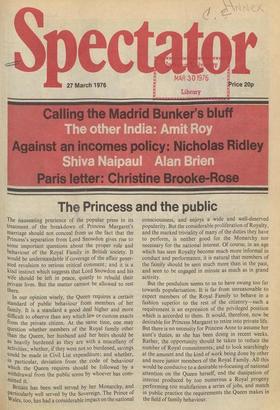The Princess and the public
The nauseating prurience of the popular press in its treatment of the breakdown of Princess Margaret's marriage should not conceal from us the fact that the Princess's separation from Lord Snowdon gives rise to some important questions about the proper role and behaviour of the Royal Family in British society. It would be understandable if coverage of the affair generated revulsion to serious critical comment; and it is a kind instinct which suggests that Lord Snowdon and his Wife should be left in peace, quietly to rebuild their Private lives. But the matter cannot be allowed to rest there.
In our opinion wisely, the Queen requires a certain standard of public behaviour from members of her family. It is a standard a good deal higher and more difficult to observe than any which law or custom exacts from the private citizen. At the same time, one may question whether members of the Royal family other than the Queen, her husband and her heirs should be as heavily burdened as they are with a miscellany of activities; whether, if they were not so burdened, savings Fould be made in Civil List expenditure; and whether, in particular, deviation from the code of behaviour Which the Queen requires should be followed by a Withdrawal from the public scene by whoever has committed it.
Britain has been well served by her Monarchy, and Particularly well served by the Sovereign. The Prince of Wales, too, has had a considerable impact on the national consciousness, and enjoys a wide and well-deserved popularity. But the considerable proliferation of Royalty, and the marked triviality of many of the duties they have to perform, is neither good for the Monarchy nor necessary for the national interest. Of course, in an age which has seen Royalty become much more informal in conduct and performance, it is natural that members of the family should be seen much more than in the past, and seen to be engaged in minute as much as in grand activity.
But the pendulum seems to us to have swung too far towards popularisation. It is far from unreasonable to expect members of the Royal Family to behave in a fashion superior to the rest of the citizenry—such a requirement is an expression of the privileged position which is accorded to them. It would, therefore, now be desirable for Princess Margaret to retire into private life. But there is no necessity for Princess Anne to assume her aunt's duties, as she has been doing in recent weeks. Rather, the opportunity should be taken to reduce the number of Royal commitments; and to look searchingly at the amount and the kind of work being done by other and more junior members of the Royal Family. All this would be conducive to a desirable re-focusing of national attention on the Queen herself, end the dissipation of interest produced by too numerous a Royal progeny performing too multifarious a series of jobs, and match in public practice the requirements the Queen makes in the field of family behaviour.


































